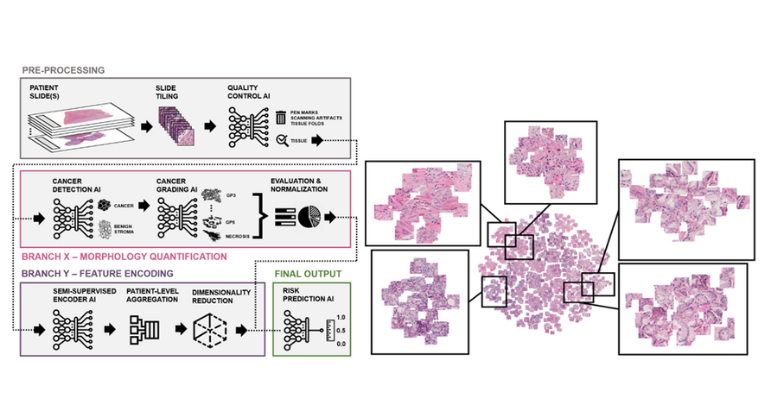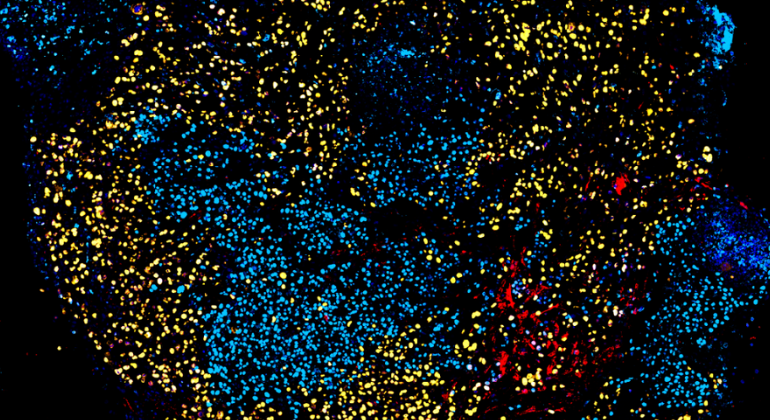“Dark Matter” in Cancer Genome Prompts Immune Response
Researchers at the Icahn School of Medicine at Mount Sinai have discovered a group of non-coding RNA molecules in cancer cells that sets off an immune response because they appear to have features similar to those of pathogens. As a result of these molecules being expressed and amplified in cancer, the immune response they generate may be influencing the cancer’s growth, investigators say in their study, published in the PNAS early edition this month.
Their finding comes from probing the part of the genome’s “dark matter” — an area known as satellite DNA — which produces large quantities of non-coding RNA (ncRNA) set apart from coding genes and mRNA. These largely mysterious RNA molecules do not produce proteins, but can have important regulatory roles.
“These ncRNAs are found in both human and mice cancer cells,” said the study’s senior investigator, Benjamin Greenbaum, PhD, an assistant professor at The Tisch Cancer Institute at the Icahn School of Medicine at Mount Sinai. “These areas were called ‘junk DNA’, but over the last five years researchers have come to understand this is the home of a number of functionally important ncRNAs.”
Nina Bhardwaj, MD, PhD, Director of Immunotherapy and professor of Hematology and Medical Oncology at The Tisch Cancer Institute at the Icahn School of Medicine at Mount Sinai and co-senior investigator on this research, added, “Cancer appears to use these ncRNAs to stimulate an immune response that could encourage tumor growth and survival, although much remains unknown about their role.”
“If further research defines these molecules as helping cancer grow it may be possible to either target and inhibit these molecules or use them as a marker to look for cancer development,” she said. “On the other hand, research may show that they are mounting some sort of immune fight against cancer. In that case, we could try to boost that effort.”
The multinational team used mathematical tools derived from theoretical physics to shine some light on ncRNA dark matter.
“We searched a large database of ncRNA for patterns of nucleotides that were unusual,” said Dr. Greenbaum, a computational biologist. “Think of the genome’s sequence of nucleotides as words. In the human genome, some of the words are typically over- and under-represented. We wanted to know how these patterns differed in the RNA transcribed in cancers, such as those from satellite regions. The methods we used allowed us to analyze this big dataset much faster.”
The team found that in several cancers where odd RNAs were being activated and transcribed, these unusual RNAs were substantially amplified —that is, many copies of them existed than were found in normal cells.
“These ncRNAs had unusual patterns that were similar to some pathogens and this causes them to stimulate an innate immune response,” said Dr. Bhardwaj.
“All in all, we believe these ncRNAs may play a significant role in mediating immune responses against cancer,” said Dr. Greenbaum. “But much work remains to describe their precise interactions.”
Researcher partners on this study include the Roswell Park Institute in Buffalo, NY; Massachusetts General Hospital in Boston; the Centre National de la Recherche Scientifique and Ecole Normale Supérieure in Paris; and the Institute for Advanced Study in Princeton, NJ.
The study was supported by grants from the NIH and the Cancer Research Institute.
About The Tisch Cancer Institute at the Icahn School of Medicine at Mount Sinai
The Tisch Cancer Institute (TCI) is a world-class translational cancer institute established in December 2007. TCI has recruited more than 30 acclaimed physicians and researchers specializing in basic research, clinical research, and population science; built outstanding programs in solid tumor oncology; enhanced existing robust programs in hematological malignancies; and advanced the study of cancer immunology and vaccine therapy. The completion of the Leon and Norma Hess Center for Science and Medicine in 2012 enabled the recruitment of 25 additional cancer researchers on two full research floors, with 48,000 square feet of space dedicated to cancer research. In 2015, TCI was named a National Cancer Institute-designated cancer center. TCI joined an elite group of 69 cancer institutions nationwide that have earned this designation, which is based on scientific excellence, robust clinical research, and beneficial community impact. To learn more about clinical trials at Mount Sinai, visit http://icahn.mssm.edu/research/clinical-trials.
About the Mount Sinai Health System
Mount Sinai Health System is one of the largest academic medical systems in the New York metro area, employing 48,000 people across its hospitals and more than 400 outpatient practices, as well as more than 600 research and clinical labs, a school of nursing, and a leading school of medicine and graduate education. Mount Sinai advances health for all people, everywhere, by taking on the most complex health care challenges of our time—discovering and applying new scientific learning and knowledge; developing safer, more effective treatments; educating the next generation of medical leaders and innovators; and supporting local communities by delivering high-quality care to all who need it.
Through the integration of its hospitals, labs, and schools, Mount Sinai offers comprehensive health care solutions from birth through geriatrics, leveraging innovative approaches such as artificial intelligence and informatics while keeping patients’ medical and emotional needs at the center of all treatment. The Health System includes approximately 9,000 primary and specialty care physicians and 11 free-standing joint-venture centers throughout the five boroughs of New York City, Westchester, Long Island, and Florida. Hospitals within the System are consistently ranked by Newsweek’s® “The World’s Best Smart Hospitals, Best in State Hospitals, World Best Hospitals and Best Specialty Hospitals” and by U.S. News & World Report's® “Best Hospitals” and “Best Children’s Hospitals.” The Mount Sinai Hospital is on the U.S. News & World Report® “Best Hospitals” Honor Roll for 2024-2025.
For more information, visit https://www.mountsinai.org or find Mount Sinai on Facebook, Twitter and YouTube.

Mount Sinai Leads Phase 3 Trial in Myelofibrosis Treatment
Mar 19, 2025 View All Press Releases
Mount Sinai Researchers Discover Why Some Colon Cancers Resist Treatment
Feb 12, 2025 View All Press Releases
Breakthrough Treatment for Liver Cancer Shows Big Promise in Global Study
Jan 09, 2025 View All Press Releases
Mount Sinai Researchers Create AI Tool to Democratize Access to Cancer Immunotherapy
Jan 06, 2025 View All Press Releases
New AI Tool by Mount Sinai Researchers Could Reshape Prostate Cancer Care
Sep 23, 2024 View All Press Releases
